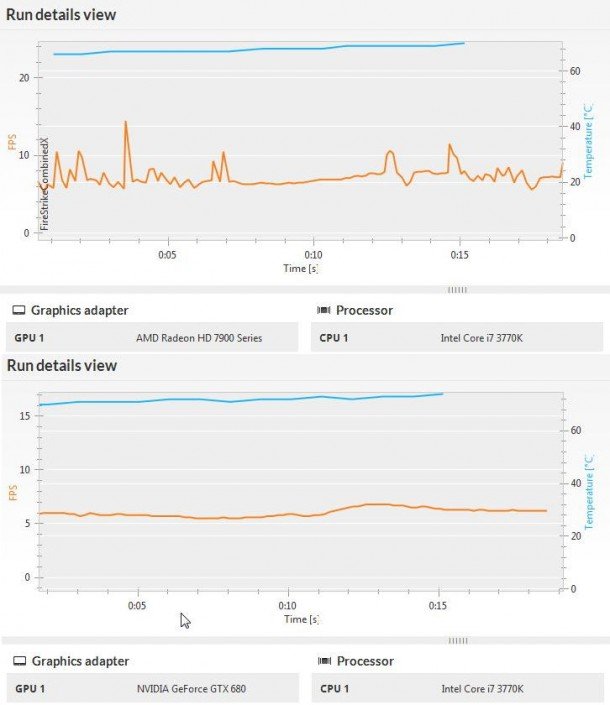3DMark wars: Nvidia and AMD go head-to-head on our test rig. Who wins?

The new version of Futuremark's 3DMark has just been released, offering us all ways to benchmark our graphics cards and PCs by using Matrix-esque squid robots. And who wouldn't want to be able to do that?
I've grabbed the current top two single-GPU graphics cards from both AMD and Nvidia and have put them head-to-head in a battle royale to see who Futuremark's squid-bot believes is the quickest graphics card out there.
And the results aren't massively surprising.
The HD 7970 comes back with a score of 3,406 and the GTX 680 hits 3,013 on the Extreme settings of the 3DMark benchmark. On the standard settings the gap between the two top GPUs increases with the AMD card hitting 6,911 and the Nvidia card just 6,049.
I was speaking with Nvidia about this yesterday, and while they are more than happy to keep ensuring their drivers work perfectly with 3DMark to give Nvidia cards the best possible results, they still see it as less important than real-world game benchmarks.
That's perhaps not surprising given that AMD's HD 7970 gives the GTX 680 a good spanking in the overall results.

But it's something I agree with too.
Keep up to date with the most important stories and the best deals, as picked by the PC Gamer team.
I haven't used the last few generations of the 3DMark benchmark suite for the simple reason that a 3DMark score is less relevant to most of us than a straight FPS score in a game that we're actually playing.
Given that a 3DMark score is also impacted by the CPU that is in the system, more than most game engines, it's not a straight test of graphics capability.
Realistically though you want as many benchmarks as possible to give you a rounded idea of just how well, or how badly, a given GPU is performing.
What's interesting about this version of 3DMark though is the amount of information it gives you afterwards and that makes better viewing for Nvidia than it does AMD.
The results graph is intriguing in that it shows a much larger, spikier variation in frame rate on the HD 7970 than it does on the GTX 680.

The Nvidia card is far smoother throughout the benchmark, and indicates that a GTX 680 will offer a more stable gaming experience even if it doesn't necessarily give the biggest average frame per second score at the end.

Dave has been gaming since the days of Zaxxon and Lady Bug on the Colecovision, and code books for the Commodore Vic 20 (Death Race 2000!). He built his first gaming PC at the tender age of 16, and finally finished bug-fixing the Cyrix-based system around a year later. When he dropped it out of the window. He first started writing for Official PlayStation Magazine and Xbox World many decades ago, then moved onto PC Format full-time, then PC Gamer, TechRadar, and T3 among others. Now he's back, writing about the nightmarish graphics card market, CPUs with more cores than sense, gaming laptops hotter than the sun, and SSDs more capacious than a Cybertruck.

